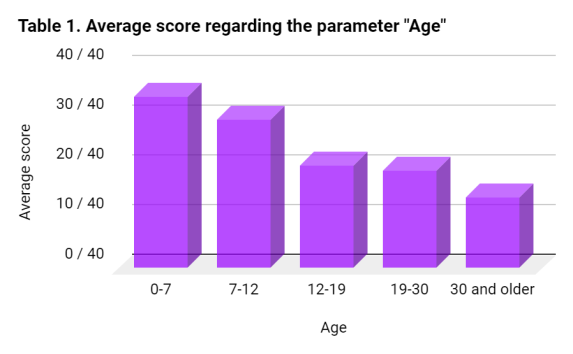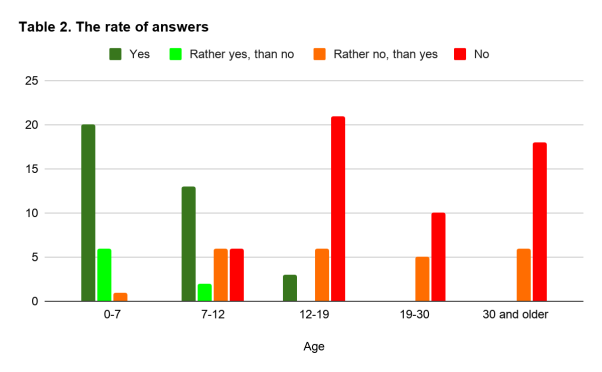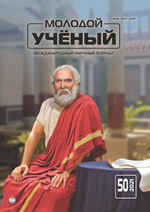The purpose of this article is to prove that a person's age does not affect the actual ability to learn (more specifically, to acquire knowledge of the English language), but only the way of perception and assimilation of this knowledge, their level. It also considers the theory that childhood, the period of initial physical and mental development, corresponds to intuitive thinking and approach to learning, while a mature person strives for analytical thinking and the most complete understanding of new information. The paper presents the results of a survey and a test, created for proving the existence between factors such as the age of onset of language, type of thinking and level of knowledge, as well as an analysis of the data obtained.
Keywords: foreign language, English, learning, analytical thinking, intuitive thinking, education, learning, adults, children, The Critical Period Hypothesis, Sensitive period.
Цель данной статьи — доказать, что возраст человека не влияет на фактическую способность к приобретению новых знаний (конкретнее, знание английского языка), а лишь на способ восприятия и усвоение этих знаний, их уровень. Также рассматривается теория о том, что детский возраст, т. е. период начального физического и психического развития, соответствует интуитивному мышлению и подходу к обучению, в то время как зрелый человек стремится к аналитическому мышлению и максимально полному пониманию новой информации. В работе представлены результаты опроса и теста, созданных для доказательства существования связи между такими факторами, как возраст начала изучения языка, тип мышления и уровень знаний, а также анализ полученных данных.
Ключевые слова: иностранный язык, английский язык, изучение, аналитическое мышление, интуитивное мышление, образование, обучение, взрослые, дети, гипотеза критического периода, сензитивный период.
Among the people of the older generation who aim to learn a particular foreign language, there is a stereotype that mastering a new language is impossible for them. Most often, this position is supported by an argument connected to older age and the belief that the possibility to acquire knowledge of a foreign language exists only in childhood. Such a stereotype most likely developed due to the omission of the fact of the typology of thinking and its dependence on the age of the subject, namely, the existence of intuitive and analytical, per se logical, thinking. This study explains the difference between the two types of thinking and correlates them with the age of the subject of learning a foreign language with the following study of the influence of the mentioned factors on the level of language. The main goal of this work is to prove the existence of a connection between the age of the subject of learning a foreign language, their type of thinking, corresponding to the age and the level of knowledge acquired . The method of the study is based on the comparative analysis of the process of thinking of a child and an adult while learning foreign language, focusing on English, and comparison of their results in practical usage of received knowledge. The article is divided into the following sections: literary review, research methods, key results and discussion, conclusion and references.
Literature review
While there are different opinions on the question of dependence of the language learners’ age on ability to acquire some language skills, this factor appears to be in the interest not only of the students, but educators (Jasmina Murad, 2006). One more not less significant issue that is the object of teachers’ attention is the best period for learners to begin their way to the second language. This section of the paper observes the biological perspective of the theme basing on the The Critical Period Hypothesis, moving on to the psychological aspect of Sensitive period and, finally, provides information about intuitive and analytical thinking.
As neurologist Eric Lenneberg (1967) formulated The Critical Period Hypothesis, it is stated that the brain of a child is more plastic, while an adult's one is already rigid and set. What is meant by «plastic» is that the language is perceived by both brain hemispheres, but this process becomes a function of only the left hemisphere with age. According to The CPH, this period starts at the age of 2 and lasts until puberty, meaning 12–13 years old. At the same time, this does not negate the ability to learn language after this period, but the process is transformed.
Moving on to the term of the Sensitive period, it is defined as a period in a person's life that creates the most favorable conditions for the formation of certain psychological characteristics, types of behavior and, what is crucially important for the current paper, the range of skills (Nemov, 1997) . Italian teacher Maria Montessori, known for her author's method of early development, defined the age from 0 to 6 as the Sensitive period of speech. According to Montessori’s division, the Sensitive period of speech development is one of the most durable. It starts right with the beginning of a child's life even in its unconscious period. In Russia, the age of six is a year of the beginning of school education and, at the same time, of the second language. Nevertheless, in accordance with the latest trends, the age of learning a second language is decreasing, which is happening not only with the spread of Montessori methods, but also because of the fashion for raising bilingual children. Taking everything into account, the earliest period of life is the period of the most efficient acquisition of language in the long term. Furthermore, the connection of these particular ages with the types of thinking will be discussed.
From a scientific point of view, there are a number of types of thinking. The current paper is focused on the types according to the classification by the level of mental processes: intuitive and analytical. Starting with the intuitive type, it is «a conscious process of comprehending the truth that is not deduced by a logical way and is included in the work, in a state of uncertainty» (Lebedev & Chumanov, 2014) . Lebedev and Chumanov state that intuitive thinking for a person who is holistic in his knowledge predicts the upcoming development of events for him, possible correct actions, steps and decisions. For instance, primitive man was not sufficiently informed, the world existed for him as an unknown dynamic system, and the world outlook was based on the reaction to the environment and on feelings in certain situations. It can be correlated with the process of how an infant learns the world. The same happens when it comes to mastering the second language at childhood. The stage of visual-figurative thinking formation (2–5 years old) is the stage when a child actively uses speech and performs mental operations. Skills of generalization, analysis and synthesis are just starting to develop but are not formed fully (Zeigarnik, 2002) . Applying all of the above to a specific case of a child learning a language, one should take into account that at this stage the subject does not yet have an understanding of the grammar of his own native language and that is why he cannot draw parallels and conduct a comparative analysis of the second language he learns with his native one. He or she has no choice but to learn the rules of a foreign language as a poem, that is, by heart. That is why many teachers include in their educational program the study of songs (for example, to memorize the alphabet) or poems (for example, to memorize the basic rules of times). To conclude the observation of the first type of thinking, there is a quote by cognitive scientist Daniel Dennett which describes intuition briefly and fully: «Intuition is simply knowing something without knowing how you got there» .
Continuing with the following type of thinking, that will be observed in this part of the work, it is needed to be highlighted that the type has several names: discursive or analytical. PhD in Psychology Bogdanov defines it as thinking mediated by the logic of reasoning and not perception or feelings. Referring to the development of thinking in ontogenesis ( Bersneva , 2010) , after the stage of visual-figurative thinking the verbal-logical follows. It starts at the age of 6, which is the age of the beginning of schooling in Russia. This period is characterized by development of the ability to establish identity, similarity and difference based on visual analysis and synthesis. Analysis and synthesis are inseparable thought processes. Only together can they create high-quality results of the task. More than that, Bloom attributed these abilities to the skills of higher level (1956) . Obviously, as a person grows up and gains experience, he or she masters the ability to analyze something. Drawing a parallel with language, for example, when studying a new time, the student seeks to analyze the given sentence in relation to time, find indicators of tense, etc.
There is the observation of psychological and biological phenomena significant for the presented theme, as well as two types of thinking and correlation to ontogenesis. The following practical part is going to test the described theory in terms of learning English as the second language on different stages of ontogenesis and corresponding thinking development level.
Research methods
The research consists in one large-scale survey divided into 3 parts. The first part focuses on the collection of basic information as the age of starting to learn English and language level. The next one is in the format of a test ordered to count the points gathered by a respondent by completing the tasks on listening, reading, grammar and vocabulary. Each section includes at least 2 tasks with different difficulty levels. The last section is based on Likert scale and suggests a self-assessment of the test passing process.
Key results and Discussion
The practical part was created in the form of a questionnaire with three sections. The key question (except for questions on basic information) of the first part is «At what age did you start learning English?». To answer, 5 age categories are suggested. The following section is a test with a maximum score of 40 points. The last section consists of 3 statements with evaluating options. Each statement evaluates the process of the test and an answer helps to recognize the predominant thinking type involved in the test solution. The statements are structured in such a way that the answers «Yes» and «Rather yes than no» imply the inclusion of intuitive thinking, and «No» and «Rather no than yes» — analytical. Thus, the prevalence of one or another answer approximately determines the type of thinking.
Firstly, the connection between the age of the beginning of learning English language and the average score among respondents is to be observed.

38 language learners of different ages participated in the survey. As it is presented in table 1 , the group of accountants who started learning English in age of up to 7, solved the test most successfully with an average score of 34 out of 40 maximum possible. In turn, those who are in the 7 to 12 age category have an average score of 4 points less. Moving on to the next group of range from 12 to 19, these respondents’ results appeared to be dramatically lower — 21 points on average (with the best result of 31 points). The next group of respondents coped almost the same with a margin of two points. Older learners from 30 years old had the worst average result (14/40), however having 24 points as the best result.
Furthermore, the connection between the results, the age and the type of thinking is to be analysed. The table 2 presents the rate of positive answers corresponding with the intuitive type and negative with rational and analytical one. According to table 2, the next relation is noted: the younger respondents are, the higher rate of «yes» and «rather yes, than no» answers are shown and contrariwise.

In order to test the theory suggested in the theoretical part, it was needed to set a parallel between the average answers of each section. The main question in the first part is «At what age did you start learning English?» which is closely connected to the theory of the Sensitive period defined by Montessori. Options of answers to this question are based on Erikson's stages of psychosocial development . The second section is the test consisting of listening, reading, grammar and vocabulary parts. Each part, except the last one, was formed of at least two tasks with different levels of language and difficultness, starting with the easiest. It was ordered for learners of every language level to pass the test. Taking the results of this part of the questionnaire into account, the overall trend corresponds to the inverse proportional relationship between the age of the beginning of learning a foreign language and its level, which proves the relevance and veracity of the statement of the Sensitive period as the best period to start learning the English language.
The last third section suggests a respondent to evaluate the process of the test and was based on Likert scale. The scale allows to evaluate the degree of agreement with the presented statements. It was stated that the earlier age corresponds to the prevalence of intuitive type of thinking and learning, respectively, meaning that a respondent did not feel the necessity to remember the certain rule, discomfort due to the unknown words and completed the tasks faster. According to table 2, the next relation is noted: the younger respondents are, the higher rate of «yes» and «rather yes, than no» answers are shown and contrariwise.
Conclusion
Taking all the presented and discussed information into consideration, the results of the practical part allow to conclude that there is a connection between such factors as the age of onset of language and type of thinking, together influencing the learners’ language level. At the same time, the earlier age is claimed to be the most propper not denying the older age as a period of impossibility of learning language.
References:
- Lenneberg, E. (1967) . The Biological Foundations of Language. Hospital practice. pp. 59–67.
- Nemov, R. S. (1997) . Uchebnik dlya studentov vysshih pedagogicheskih uchebnyh zavedenij. Psihologiya obrazovaniya. pp. 608.
- Montessori M. The Montessori method of education. URL: https://en.wikipedia.org/wiki/Montessori_education
- Lebedev, I.B. & Chumanov, U.V. (2014) . Intuitivnoe myshlenie kak fenomen chelovecheskoj psihiki. CHelovecheskij kapital. issue 8. pp. 67–70.
- Zejgarnik, B.V. & Zejgarnik, V.A. (2013) . Patopsihologiya. Textbook for bachelors.
- Dennett, D. (2017). An interview with BBC Radio 4's The Life Scientific.
- https://web.archive.org/web/20111207162921/http://website-seo.ru/067511021132.html HOW SHOULD I MAKE A REFERENCE HERE?
- Berseneva, N.V. (2010) . The Dynamics of Creative Thinking Development in the Ontogenesis. Kul'turno-istoricheskaya psihologiya. № 6. pp. 60–66.
- Bloom, B. S. & Engelhart, M. D. & Furst, E. J. & Hill, W. H. & Krathwohl, D. R. (1956). Taxonomy of educational objectives: The classification of educational goals. Handbook I: Cognitive domain. New York: David McKay Company.
- Likert R. Likert scale. URL: https://en.wikipedia.org/wiki/Likert_scale
- Erikson J. Erikson's stages of psychosocial development. URL: https://en.wikipedia.org/wiki/Erikson %27s_stages_of_psychosocial_development







